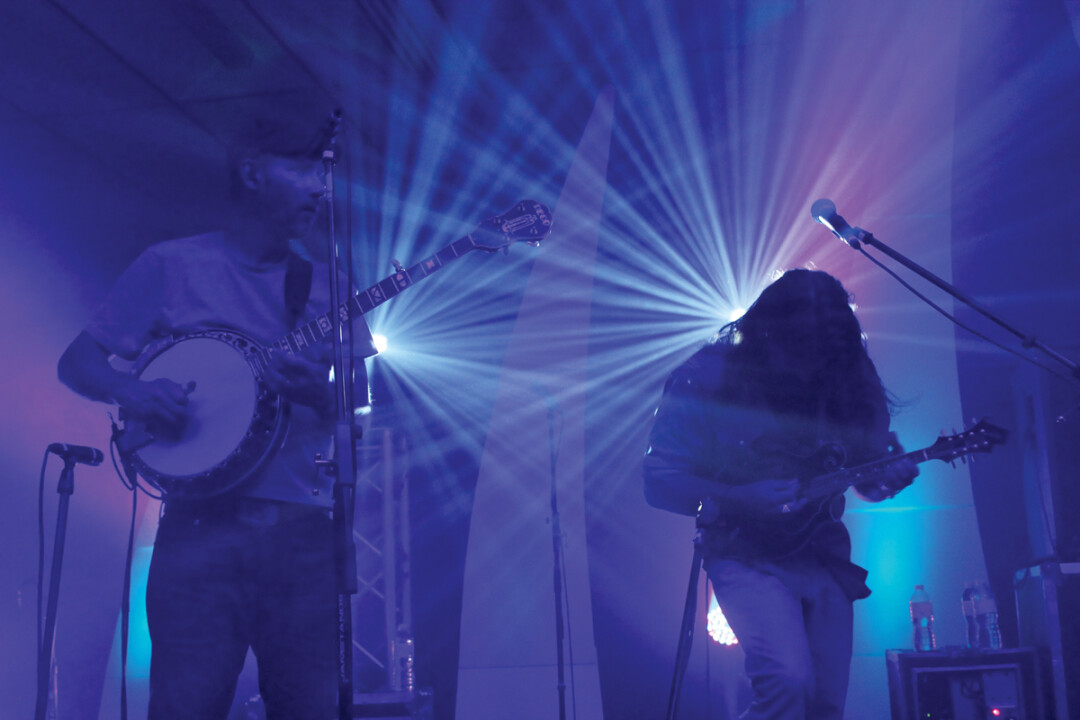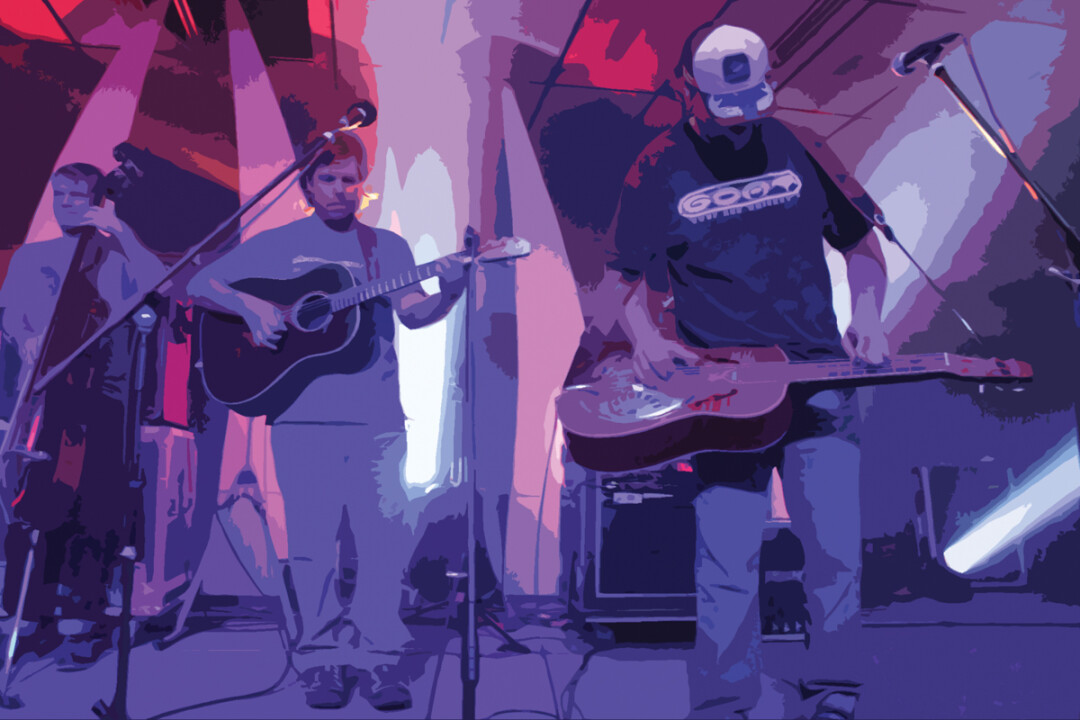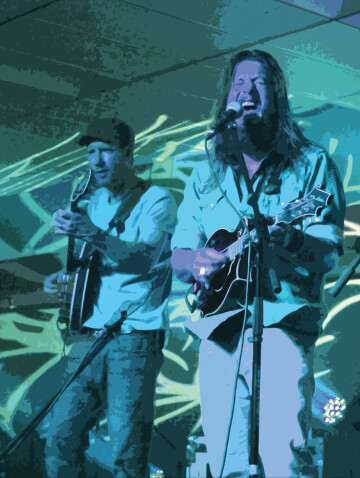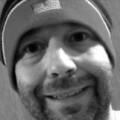Greensky Bluegrass Interview with Mike Devol
Greensky Bluegrass is: Anders Beck (dobro), Michael Arlen Bont (banjo), Dave Bruzza (guitar), Mike Devol (upright bass) and Paul Hoffman (mandolin).
“There’s this great duality to our band,” reflects Greensky Bluegrass mandolinist, vocalist, and songwriter Paul Hoffman. “We’re existing in a few different places at once: we’re a bluegrass band and a rock band, we’re song-driven and interested in extended improvisation.”
BR: Hello Mike, it’s good to talk to you today. Your band, Greensky Bluegrass, will be in Bozeman Wednesday, Nov 11th at the new Faultline North.
MD: We like it up there man. We played the Filling Station, The Zebra Lounge and last time the University Ballrooms. I have heard the new place is cool and we are looking forward to seeing it.
BR: It’s going to be fun. So you guys are from Kalamazoo, Mi, as a band, but where did you grow up?
MD: I lived in Ackron Ohio and moved to Kzoo in 2000 and went to college there. Over the course of going to college I started to work at Bell’s Brewery that’s how I met Greensky.
We are still Greensky Bluegrass from Kalamazoo but only our banjo player lives there now. We have three guys in Denver now and myself, I am in the Bay Area, Oakland, CA. We are a little spread out but Kalamazoo is certainly home and the starting point for the band.
BR: How did you become interested in bluegrass music yourself?
MD: I was studying classical cello at Western Michigan University when I came into my own personal interest with bluegrass, and also became friends with Greensky. They were already a band when I met them. For me, playing in Greensky and playing the upright bass happened all at once. They had a bass player who wasn’t willing to go on tour and I was a friend of theirs and was into the project, so I was playing cello and we had the idea that I would learn upright and take over for their current bass player. And at one point he was done and I had the full time spot as bassist for Greensky.
Kinda started big with joining Greensky, but I was listening to bluegrass before that as well. The other guys sorta came in from the non-traditional side, but from Old Jerry Garcia or David Grisman recordings, and even like the bluegrass side of Phish and the Grateful Dead, sorta in that space where it exists. I was a fan. I was listening to Bela Flek and Alisson Krause and was open to it. I was playing classical cello, and strings were my world. For me playing bass in a bluegrass band was just a place for me to cross over into another world, but one where I could still use what I had learned in my music education about playing strings and texturizing with other instruments. Somehow it seems strange looking back on it. I was playing in a string quartet playing classical music sort of led naturally to playing in a bluegrass band. That’s how I came into it. That was like ten or eleven years ago now.
BR: Did you finish your degree or just join the band and quit school?
MD: I did finish. I got my degree in classical cello performance. I think at the time when I was finishing my degree I knew that I wasn’t going to be pursuing a career (at least at that point) in classical cello performance. You know I think my cello professor knew it as well (Laughs) but I was a senior in college and I finished it out. I wanted to get my degree.
It’s funny at this point in my career with Greensky I am using more of my music education than I was at the beginning. I had chops as a cellist but I was learning a very simplistic approach to upright bass, and playing in the band at that time was more simplistic than we are now. 
It’s funny in the later years we have been able to be more intentional about the music we are making, the albums we are creating and the jams we are creating on stage. Our ideas are getting more interesting and our ability to listen to each other and play with each other, that’s growing. It’s cool again to be able to see my music theory training be able to help me make sense of what’s happening on stage, and helping for us to design new ideas to make happen on stage.
So I did finish my degree, but with no intentions of becoming a classical cellist. I already knew even before I met Greensky that wasn’t really my path. Originally when I met Greensky I was thinking I would end up in a music administration job like managing an orchestra or management for a band or something. I was looking for someway to get to the other side of the music business. I would have never assumed that I would end up playing bass in an eventually pretty successful, loud, somewhat influential bluegrass-ish band, so it has been a fun wild ride.
BR: Nice, nice. Within the bluegrass-ish genre who are some of your biggest influences, and also who are some of your favorite up and coming bluegrass-ish artists?
MD: Some of the obvious ones that we feel like we are at least a little responsible for carrying the torch for, or being the next generation of progressive bluegrass, like Yonder (Mountain String Band) is there with us even before we were, and now we are bringing a little new color to that scene.
The bands before us that have been super influential, like mainly in their ability to approach bluegrass in the way which some people would say is the “wrong way”, but bands like Leftover Salmon where they just opened it up and it is like this amazing fast rock n roll party, and their drums. Before them maybe New Grass Revival with Bela Flek and Sam Bush. Back in the 80’s these were the obvious forerunners to a band like us. Taking bluegrass and kinda flipping it and approaching if from the viewpoint of rock. I think the thing that we share with those bands is that a lot of our influences are not just bluegrass music at all, but influences in rock and jazz, and electronic music, and indie music and all the other music we love. It is the ability to bring that into the bluegrass type music that we play. That’s what sets us apart with those guys.
I generally don’t listen to a lot of bluegrass or a lot of jam music, every once in a while I need to listen to some Phish, but I think these days what is helping make Greensky is the ‘other’ influences on us. I listen to a lot of indie rock and songwriters.
As far as the up and comers right now I love Fruition out of Portland. They started as a lot more of a string band than they are now so naturally when we came through Portland we found them opening for us a few times. They have really become a huge force I think. They are touring right now and they are fully a rock band. They have drums and electric guitars and keys so they are now more of a rock band than we are but there is a mandolin and there is string elements and textures. They are a band that is really based on just having great songs. When anybody asks me of a new band that I love I tell them about Fruition. I think they are Sick.
There is also a little bit more of a traditional band out of the bay area, a 5 piece string band called ‘Brothers Comatose’ which I think rocks too. They have a real rock solid and confident sound. Their shows are real fun and I think both those bands have a real good scene.
It is weird. I feel like Greensky has a lot further to go in their path, but it is moments like these looking back after over ten years, there is plenty to think about. Now bands like Salmon and Yonder and String Cheese are our colleagues in this and as much as they’re the trendsetters, what I mean is we are all friends and buddies and cohorts of sorts.
BR: That’s cool. So lets chat about your guys newest album that came out a year ago in September called “If Sorrows Swim”. Are there any tracks that stand out to you as favorites for some reason?
MD: Yes. I am still really proud of that album. A couple of those songs are still my favorites, and I think they are interesting choices. They are so different in the reasons why they are my favorites.
First one is ‘Leap Year’ which is cool on the album, but I think it sort of suggests more of what the Greensky Live experience is like. We make weird noises for a real long time and since we have made the album with the intention of having some openness in that song, that is one song that has really expanded on stage into a real cool live vehicle. It is a great song and has become one of the current staples of a Greensky Live experience. Leap Year, I love that song.
The other one that’s my favorite is ‘Windshield’ which I think is a lot of people’s favorite. It is the opening track on the album, kind of maybe a bit poppier than some of the other songs we had done. The way we recorded that song was real interesting and I think that will always resonate with me when I listen to it. We were all in the room playing together at the same time, and it kinda just became naturally what it is in it’s own growth and the way it resolves in the end, and it came together in a serendipitous moment. Paul actually sang that one live while we were recording from the recording booth. That one came together really organically, so it was an experiment for us on how things came together with texture and an experiment with a new recording process for us and we all think it turned out great.
It feels like going into the studio after an album that was as well received as If Sorrows Swims is always a fun challenge to see how interested we are in what we are doing, and finding our path, and not only finding new sounds and ways we can be better, but also finding ways to remember what we have recorded in the past and who we are and where we come from. Also, what our fans appreciate about us and what they expect from us. We don’t want to change the formula too much. We want to give our fans and listeners what they have come to love, but we always want to push that envelope and go for something new. Handguns was a great example of that and on If Sorrows Swims we were able to extrapolate a little more on that and I think whatever becomes of our next project, it is nice to see our music having a pleasant arc that we are all proud of. We appreciate all our fans who like what we do even a small fraction of how much we love it, because that is why we do what we do.
BR: So you certainly have touched on how Greensky Bluegrass is a little more than a bluegrass band and your live shows certainly approach or even hold steady in the rock genre. What can people expect from you guys this tour when you stop at Faultline North on November 11th?
MD: We always keep our playlist fresh. If you know our reputation live, we take our set lists pretty seriously in that we like to mix it up and we know our fans often see multiple shows. If people love Greensky they will get more of what they came for. We all pride ourselves with the feeling that we are always growing and always getting better as individual players, and as listeners, and as a band in working together to create music.
Plan on us showing up excited and super warmed up and dialed in. We start tour tomorrow (Oct 22) and we play four or five nights a week until we get to Bozeman so we are going to be dialed in and we are going to be stoked to be in the mountains. We are looking forward to the new venue and just being back in Bozeman proper.
BR: Yeah, you were close by last year at Targhee Fest, I know a lot of Bozeman folks saw you there.
MD: Our fan base in Montana is real good to us and I think we have been growing that due to Targhee. We haven’t been to Bozeman since the college gig, but we have been to Missoula and Targhee and we know people in Bozeman have been watching us on the radar and we are excited to see them all again.
BR: We look forward to seeing you back in Bozeman, safe travels and we will talk to you soon.
